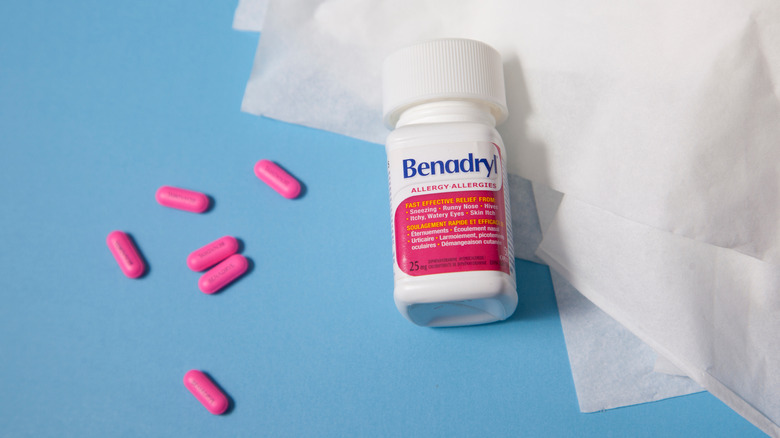Is It Safe To Take Benadryl While Pregnant?
Managing allergies can be nerve-racking, whether you're pregnant or not. While some women get relief from allergies during pregnancy, others may experience worsening symptoms. Luckily, these problems are unlikely to affect your baby, says the Cleveland Clinic. In mild cases, it may be enough to avoid your triggers and use simple home remedies. If, say, you're allergic to pollen or dust, it makes sense to limit the time spent outdoors on dry, windy days.
The Cleveland Clinic also recommends using a humidifier, which may help ease nasal congestion. Saline nasal sprays can help, too. But if you have atopic dermatitis, asthma, or other more severe reactions, home remedies won't fix the problem. Chances are, you'll need to take antihistamines, a class of drugs that relieve allergy symptoms. These medications block the release of histamine, a chemical responsible for hives, watery eyes, runny nose, itching, and other allergic reactions. Most antihistamines are safe, but they can cause mild side effects, such as drowsiness, sleepiness, or dry mouth, notes MedlinePlus.
Benadryl, one of the most widely used antihistamine drugs, contains the active substance diphenhydramine. This compound is particularly effective for hay fever, seasonal allergies, motion sickness, and the common cold explains WebMD. The downside is that it can upset your stomach or cause dizziness, blurry vision, and other mild adverse reactions. Its safety during pregnancy is also subject to debate.
Think twice before taking Benadryl during pregnancy
Benadryl comes in several different forms, including oral tablets, liquid-filled capsules, and solutions as well as topical creams, gels, sprays, and sticks.
Its active compound is a first-generation antihistamine, according to the American Academy of Family Physicians. This class of medications is more likely to cause side effects than second-generation antihistamines, such as Zyrtec and Claritin, but it's generally safe for healthy adults.
Some studies have found that antihistamines may cause birth defects, notes the Centers for Disease Prevention and Control (CDC). However, most researchers say these drugs are safe during pregnancy. The CDC recommends consulting your doctor before taking any medications or supplements, even if they are OTC brands. "Benadryl is class B, meaning it's safe in animal studies, but there are no human studies on Benadryl in pregnancy," ob-gyn Margaret Sullivan told Forbes. "Nevertheless, we've been using it for decades, so it's considered a very safe pregnancy medication," she added.
But even so, Dr. Sullivan says it's hard to tell how this medication will affect your baby. What's more, it may cause dizziness, low blood pressure, blurred vision, and other issues that could result in falls or injuries. Higher doses may increase the risk of Benedryl side effects, warns Dr. Sullivan. To stay safe, try not to exceed 50 milligrams of Benadryl per day. Ideally, take 25 milligrams at bedtime for a couple of days and adjust the dose as needed. Zyrtec and other second-generation antihistamines may be a better choice during pregnancy, suggests the Cleveland Clinic.


